The term rumba may refer to a variety of unrelated music styles. Originally, "rumba" was used as a synonym for "party" in northern Cuba, and by the late 19th century it was used to denote the complex of secular music styles known as Cuban rumba. Since the early 20th century the term has been used in different countries to refer to distinct styles of music and dance, most of which are only tangentially related to the original Cuban rumba, if at all. The vague etymological origin of the term rumba, as well as its interchangeable use with guaracha in settings such as bufo theatre, is largely responsible for such worldwide polysemy of the term. In addition, "rumba" was the primary marketing term for Cuban music in North America, as well as West and Central Africa, during much of the 20th century, before the rise of mambo, pachanga and salsa.

Congolese music is one of the most influential music forms of the African continent. Since the 1930s, Congolese musicians have had a huge impact on the African musical scene and elsewhere. Many contemporary genres of music, such as Kenyan Benga and Colombian Champeta, have been heavily influenced by Congolese music. In 2021, Congolese rumba joined other living traditions such as Jamaican reggae music and Cuban rumba on UNESCO's "intangible cultural heritage of humanity" list.
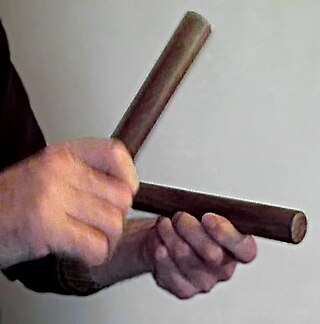
The clave is a rhythmic pattern used as a tool for temporal organization in Brazilian and Cuban music. In Spanish, clave literally means key, clef, code, or keystone. It is present in a variety of genres such as Abakuá music, rumba, conga, son, mambo, salsa, songo, timba and Afro-Cuban jazz. The five-stroke clave pattern represents the structural core of many Cuban rhythms. The study of rhythmic methodology, especially in the context of Afro-Cuban music, and how it influences the mood of a piece is known as clave theory.

The music of Angola has been shaped both by wider musical trends and by the political history of the country. while Angolan music has also influenced the music of the other Lusophone countries and Latin American countries. In turn, the music of Angola was instrumental in creating and reinforcing "angolanidade", the Angolan national identity. The capital and largest city of Angola — Luanda — is home to a diverse group of styles including kazukuta, semba, kizomba and kuduro. Just off the coast of Luanda is Ilha do Cabo, home to an accordion and harmonica-based style of music called rebita.

Soukous is a genre of dance music originating from the Democratic Republic of the Congo and the Republic of the Congo. It derived from Congolese rumba in the 1960s, with faster dance rhythms and bright, intricate guitar improvisation, and gained popularity in the 1980s in France. Although often used by journalists as a synonym for Congolese rumba, both the music and dance associated with soukous differ from more traditional rumba, especially in its higher tempo, song structures and longer dance sequences.
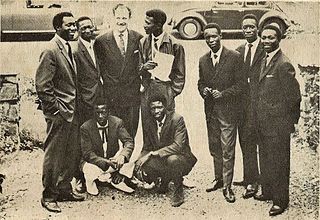
Le Grand Kallé et l'African Jazz, often simply referred to as African Jazz, was a popular and extremely influential Congolese rumba band from the modern-day Democratic Republic of the Congo. Founded in 1953 in Léopoldville under Belgian colonial rule, the band was led by Joseph Kabasele Tshamala, popularly known by his stage name Le Grand Kallé. The group saw its heyday between 1958 and 1962, after which it was hit by defections by its members in 1963. It was briefly revived after 1966.
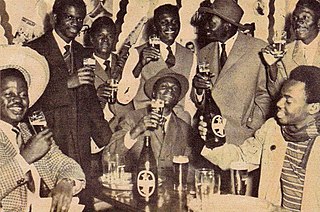
OK Jazz, later renamed TPOK Jazz, was a Congolese rumba band from the Democratic Republic of the Congo established in 1956 and fronted by Franco. The group disbanded in 1993, but reformed in 1996.

African popular music, can be defined as any African music, regardless of genre, that uses Western pop musical instruments, such as the guitar, piano, trumpet, etc. Afropop is a genre of music that combines elements from both African traditional music with Western pop music, characterized by the use of African rhythms and melodies, as well as western instrumentation and production techniques. Like African traditional music, Afropop is vast and varied. Most contemporary genres of western popular music build on cross-pollination with traditional African American and African popular music. Many genres in popular music of rock, metal, pop, blues, jazz, salsa, zouk, and rumba derive, of varying degrees, musical traditions from Africa cultured to the Americas, by enslaved Africans. These rhythms and sounds have subsequently been adapted by newer genres like hip-hop, and R&B. Likewise, African popular music have adopted Western music industry recording studio techniques. The term does not refer to a specific style or sound but is used as a general term for African popular music.
Sam Mangwana, is a Congolese-born musician, born to Angolan parents. He was the frontman of his bands Festival des Maquisards and African All Stars. Mangwana was a member of François Luambo Makiadi's seminal band TPOK Jazz, and Tabu Ley Rochereau's bands African Fiesta, African Fiesta National and Afrisa International.

Ricardo Lemvo is a Congolese singer of Angolan descent who lives in Los Angeles, California. His music is a blend of African soukous, kizomba, samba and Cuban salsa.
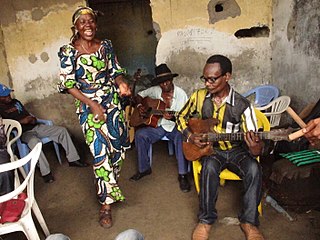
Congolese rumba, also known as African rumba, is a dance music genre originating from the Republic of the Congo and Democratic Republic of the Congo. With its rhythms, melodies, and lyrics, Congolese rumba has gained global recognition and remains an integral part of African music heritage. In December 2021, it was added to the UNESCO list of intangible cultural heritage.
Jimmy Omonga is a singer and songwriter from the Democratic Republic of the Congo. With his debut album "Destin" (2008), he became within a few months one of Congo's new popular singers, known for his characteristic and unique voice; clear and ringing in its upper reaches, with soulful low notes.
Simaro Massiya Lutumba Ndomanueno, known as Simaro, was a Congolese music rhythm guitarist, songwriter, poet, composer, and bandleader. He was a member of the seminal Congo music band TPOK Jazz, which dominated the music scene in the Democratic Republic of the Congo (DRC) from the 1960s to the 1980s.
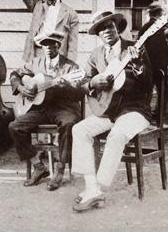
A guajeo is a typical Cuban ostinato melody, most often consisting of arpeggiated chords in syncopated patterns. Some musicians only use the term guajeo for ostinato patterns played specifically by a tres, piano, an instrument of the violin family, or saxophones. Piano guajeos are one of the most recognizable elements of modern-day salsa. Piano guajeos are also known as montunos in North America, or tumbaos in the contemporary Cuban dance music timba.
African Jazz Mokili Mobimba was a popular song written in the Congolese rumba style by Charles Mwamba Déchaud and performed by Joseph Kabasele's band, African Jazz.
Kekele was a band formed in 2000, composed of leading veteran African musicians, mostly from the Democratic Republic of the Congo. They played Congolese rumba in a revival style harkening back to the 1950s, 60s, and 70s, using acoustic guitars. Kekele seems to be dormant or defunct, having not released a recording since 2006 nor performed since (apparently) 2010.
Syran Mbenza is a guitarist, originally from the Democratic Republic of the Congo, who has lived in Paris since about 1981. He has recorded and performed prolifically over five decades, including as a solo artist; as one of the four members of the popular soukous "supergroup" Les Quatre Étoiles; as a founding member of the acoustic, Congolese rumba revival band Kékélé; in other bands; and in support of numerous artists. He has been described as one of the greatest guitar players of Africa.

"Mario" is a song by Congolese guitarist Franco and his group TPOK Jazz from his eponymous 1985 album. It is considered to be the musician's biggest hit.
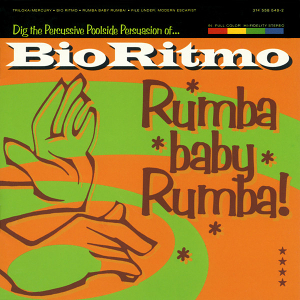
Rumba Baby Rumba! is an album by the American band Bio Ritmo, released in 1998. The band supported the album by touring with Squirrel Nut Zippers.
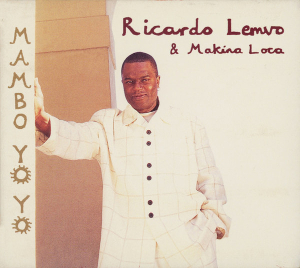
Mambo Yo Yo is an album by the Congolese musician Ricardo Lemvo, released in 1998. He is credited with his band, Makina Loca. Lemvo supported the album with a North American tour that included shows as part of his label's AfroLatino Nights tour.












